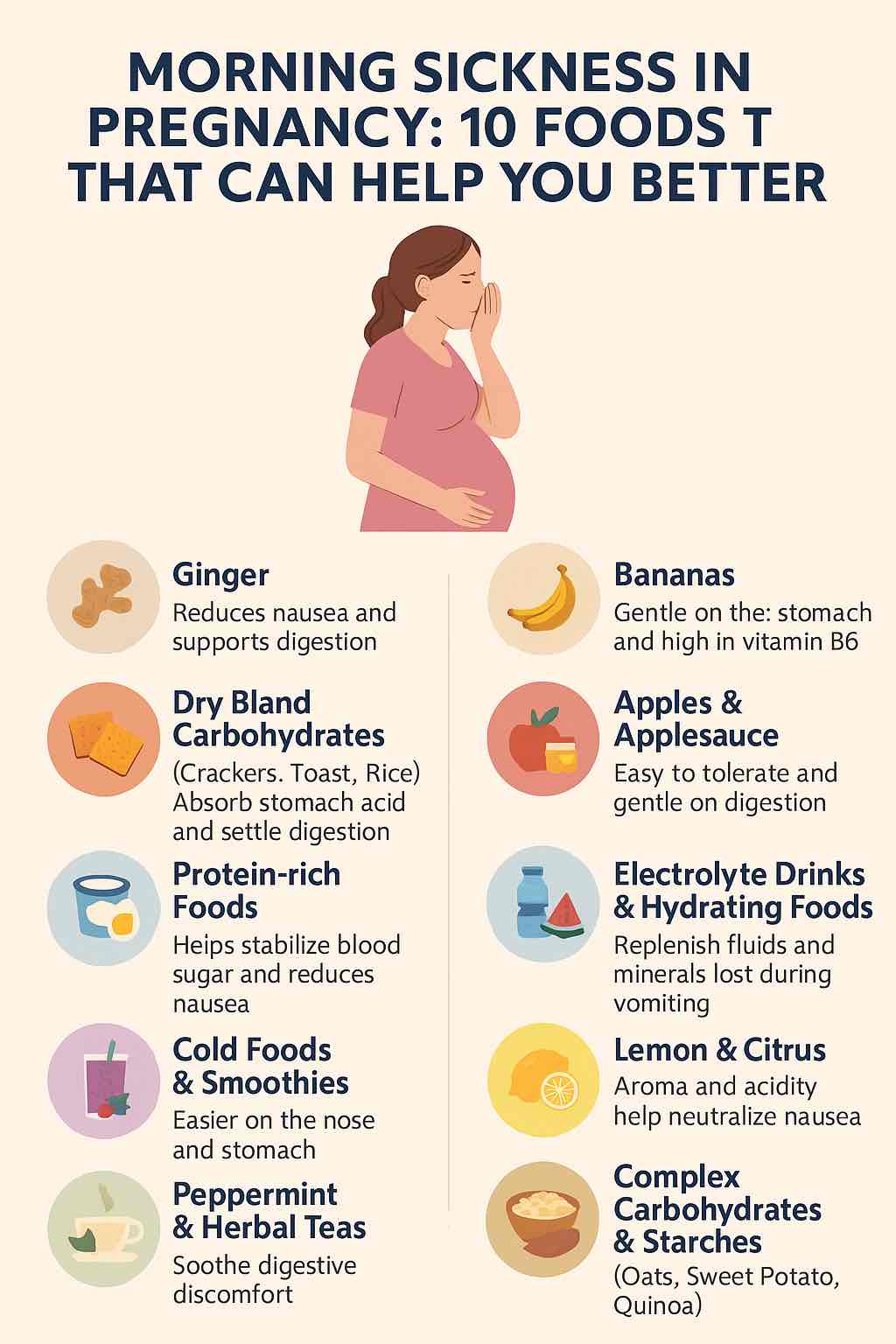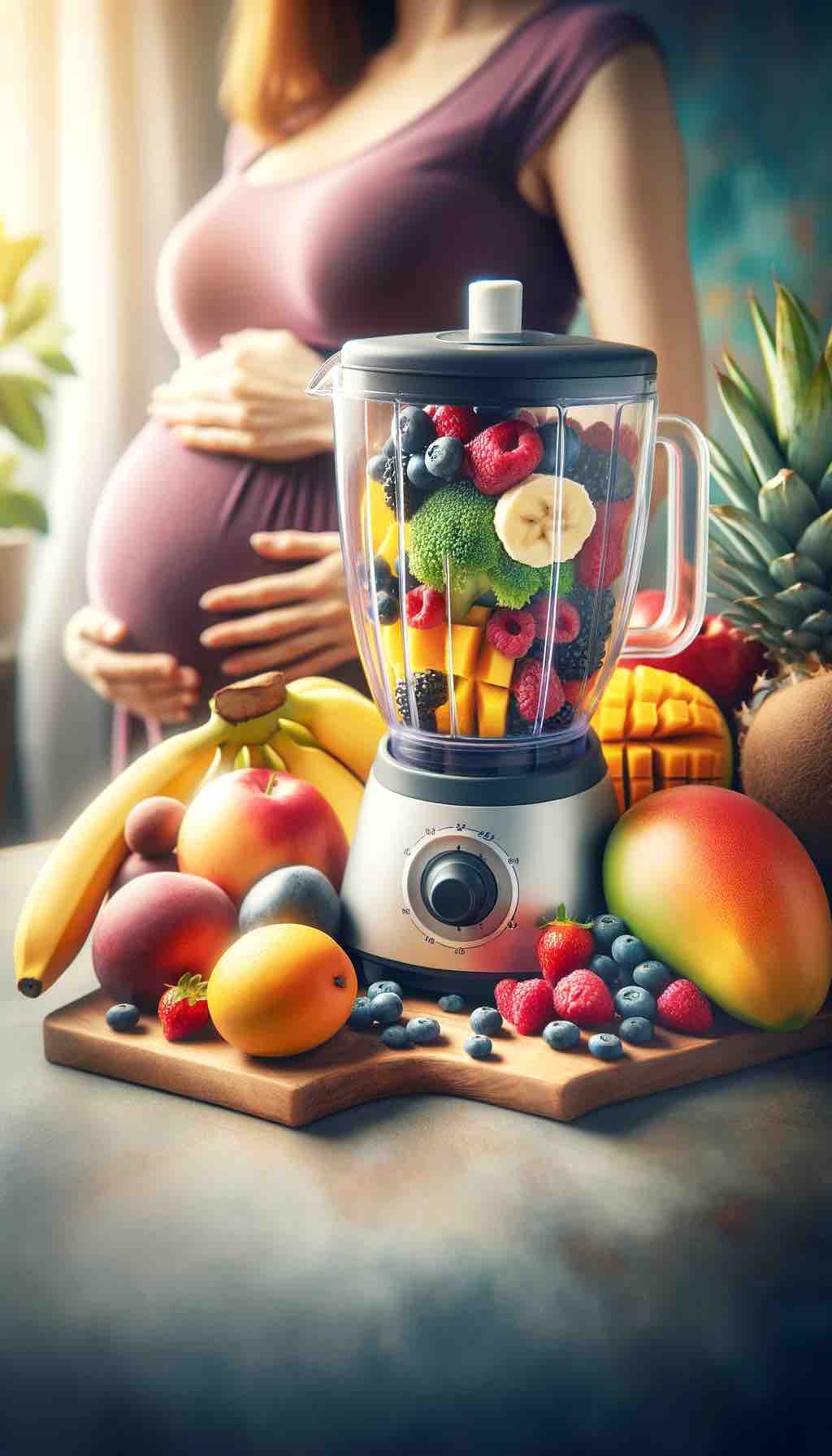
Pregnancy is a transformative journey, but it often begins with a less-than-glamorous phase: morning sickness. Despite its name, morning sickness can strike at any time of day and affects nearly 70% of pregnant women during the first trimester. Symptoms range from mild queasiness to persistent nausea and even vomiting. While this is often considered a sign of a healthy pregnancy, it can significantly impact a woman’s daily life and well-being. The good news? Diet can play a pivotal role in managing morning sickness. In this comprehensive guide, we explore ten foods that are backed by science and widely recommended by healthcare professionals to help soothe nausea during pregnancy.

1. Ginger: Nature’s Nausea Remedy
Why it helps: Ginger has been used for centuries to treat digestive issues. Modern research supports its effectiveness in alleviating nausea and vomiting in pregnancy. It works by enhancing gastric motility and has anti-inflammatory properties that calm the digestive system.
How to consume: Sip on ginger tea, nibble crystallized ginger, or add freshly grated ginger to smoothies and soups. Ginger capsules are also an option, but consult your healthcare provider first.
2. Bananas: Gentle and Nourishing
Why it helps: Bananas are rich in potassium and vitamin B6—both nutrients known to reduce nausea. They are easy to digest, making them ideal for sensitive stomachs.
How to consume: Eat a banana on its own, blend it into a smoothie, or pair it with peanut butter for a quick and satisfying snack.
3. Bland Carbohydrates: The Safe Bet
Why it helps: Simple, bland carbohydrates like toast, rice, and crackers can absorb stomach acid and provide quick energy without overwhelming the digestive system.
How to consume: Keep plain crackers at your bedside and eat a few before getting out of bed. Rice or dry toast can serve as a base for more nutritious toppings later in the day.
4. Apples and Applesauce: Antioxidant-Rich Comfort
Why it helps: Apples are high in fiber and antioxidants, which help settle the stomach. The pectin in apples may aid digestion.
How to consume: Try raw apple slices, unsweetened applesauce, or mix into oatmeal or smoothies.
5. Protein-Rich Foods: Stabilize Blood Sugar
Why it helps: Protein can help maintain stable blood sugar levels, which in turn may prevent the dips that trigger nausea. Research suggests small amounts of protein throughout the day can reduce nausea.
How to consume: Snack on hard-boiled eggs, Greek yogurt, nuts, seeds, or small servings of lean meat. Plant-based options like tofu or protein-fortified shakes are also great.
6. Hydrating Foods and Electrolyte Drinks
Why it helps: Vomiting leads to fluid and electrolyte loss. Rehydrating is crucial to prevent dehydration, which can worsen nausea.
How to consume: Choose coconut water, sports drinks like Pedialyte, or homemade electrolyte-rich smoothies. High-water content foods like watermelon and cucumber also help.
7. Cold Foods and Smoothies: Less Aroma, Easier Tolerance
Why it helps: Warm foods often emit strong smells, which can intensify nausea. Cold foods usually have a milder scent and texture.
How to consume: Make nutrient-packed smoothies with fruits, spinach, Greek yogurt, and a touch of ginger. Yogurt parfaits, cold soups, and frozen fruit bars are other soothing options.
8. Citrus Fruits and Lemon: Aromatherapy and Acidity
Why it helps: The scent and acidity of citrus fruits like lemons can cut through nausea. Lemon contains natural compounds that may stimulate the digestive system and reduce queasiness.
How to consume: Sip lemon-infused water, sniff a fresh lemon slice, or add a splash of citrus juice to your meals. Lemon essential oils are also popular for quick relief.
9. Peppermint and Herbal Teas: Soothing and Safe
Why it helps: Peppermint is known to relax the stomach muscles and improve the flow of bile, making digestion smoother. Herbal teas can calm the gastrointestinal tract.
How to consume: Drink peppermint tea or suck on mint candies. Always verify that herbal teas are pregnancy-safe; chamomile, lemon balm, and rooibos are usually good alternatives.
10. Complex Carbohydrates and Whole Grains: Sustained Energy
Why it helps: Foods like oatmeal, quinoa, and sweet potatoes provide long-lasting energy and help maintain stable blood sugar. They are also rich in fiber, aiding digestion.
How to consume: Prepare a warm bowl of oatmeal topped with fruit, snack on roasted sweet potato wedges, or incorporate quinoa into salads.
✅ Quick “Grab-and-Go” Food List
| Food Category | Examples |
|---|---|
| Ginger | Ginger tea, chews, fresh slices |
| Bland carbs | Crackers, toast, rice, dry cereal |
| Fruit | Banana, applesauce, citrus slices |
| Protein | Yogurt, kefir, nuts, eggs, protein shakes |
| Hydrating fluids/foods | Electrolyte drinks, watermelon, cucumber |
| Cold & Smooth | Smoothies, cold soups, frozen fruit pops |
| Herbal/citrus | Lemon water, peppermint/ginger tea |
| Starchy grains | Oatmeal, quinoa, sweet potato prep |
Additional Tips for Managing Morning Sickness
- Eat small, frequent meals: An empty stomach can worsen nausea, so eat every 2-3 hours.
- Stay hydrated: Sip water, herbal teas, or electrolyte drinks between meals.
- Avoid triggers: Identify and steer clear of smells or foods that worsen your nausea.
- Consider vitamin B6 supplements: Often recommended by doctors, B6 can help reduce nausea. Dosage should be guided by a healthcare provider.
- Try acupressure wristbands: These apply pressure to specific points and may provide relief.
- Seek medical advice: If symptoms are severe or persistent, talk to your doctor. Prescription medications are available and safe for many women.
Final Thoughts
Morning sickness, while unpleasant, is usually a temporary phase and a sign that your body is adjusting to pregnancy. Choosing the right foods can make a significant difference in how you feel. From soothing ginger to hydrating watermelon and protein-rich snacks, there are plenty of nourishing options to help you navigate this challenging stage with greater ease. Always consult your healthcare provider before making major dietary changes or introducing supplements.
Remember: every pregnancy is different. Listen to your body, eat what you can tolerate, and be kind to yourself. This too shall pass.
Frequently Asked Questions (FAQs)
1. What causes morning sickness during pregnancy?
Morning sickness is primarily caused by hormonal changes—especially the rapid rise in human chorionic gonadotropin (hCG) and estrogen—in early pregnancy. Sensitivity to smells, stress, and fatigue can also exacerbate symptoms.
2. When does morning sickness typically start and end?
It usually begins around week 6 of pregnancy and peaks between weeks 8 and 11. Most women find relief by week 14–16, although for some, it may continue longer.
3. Is morning sickness harmful to the baby?
In most cases, no. Mild to moderate morning sickness is considered a normal part of pregnancy and doesn’t harm the baby. However, severe cases (hyperemesis gravidarum) may require medical treatment.
4. Can I take ginger supplements safely during pregnancy?
Yes, ginger is generally considered safe in moderate amounts (up to 1 gram/day). However, consult your healthcare provider before starting any supplement, especially if you’re taking medications or have preexisting conditions.
5. What foods should I avoid if I have morning sickness?
Avoid spicy, greasy, or highly aromatic foods. Caffeine and strong-smelling vegetables like broccoli or cauliflower may also trigger nausea in some women.
6. How do I stay hydrated if I can’t keep water down?
Try small sips of cold or flavored water, electrolyte drinks, ice chips, or water-rich fruits like watermelon and cucumber. Drinking between meals instead of during meals can also help.
7. Are there medical treatments for severe morning sickness?
Yes, options include vitamin B6, doxylamine (an antihistamine), anti-nausea medications like ondansetron (Zofran), and IV fluids in extreme cases. Always consult a healthcare provider.
8. Is it safe to fast during pregnancy if eating makes me nauseous?
Fasting isn’t recommended during pregnancy. Instead, eat small, frequent meals or snacks with bland, easy-to-digest foods to avoid triggering nausea from an empty stomach.
9. How can I meal prep when I feel nauseated most of the time?
Opt for cold foods or snacks that require minimal preparation. Consider preparing meals when symptoms are milder (often evenings), or ask a partner/support person to help with cooking.
10. Will morning sickness affect my weight gain during pregnancy?
A small amount of weight loss in the first trimester is common due to nausea. As long as you’re able to maintain hydration and nutrition overall, it usually doesn’t pose a long-term concern. Talk to your provider if weight loss is significant or prolonged.












